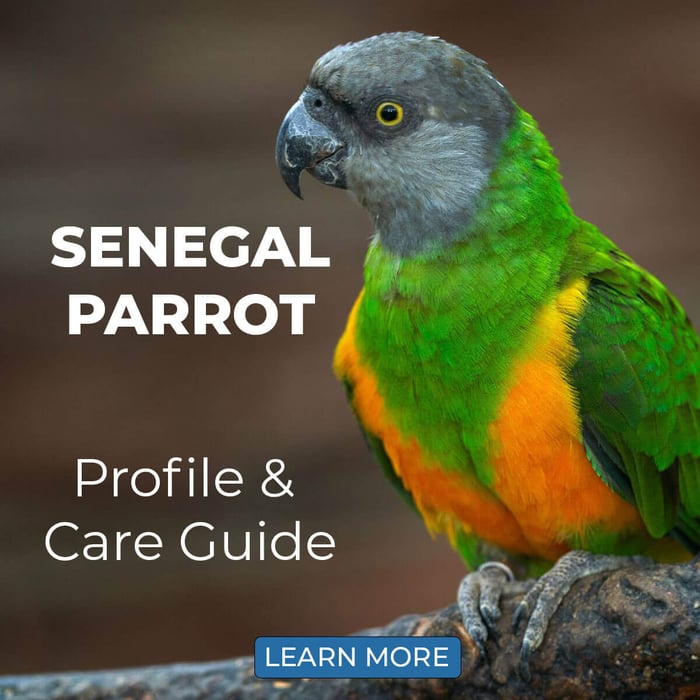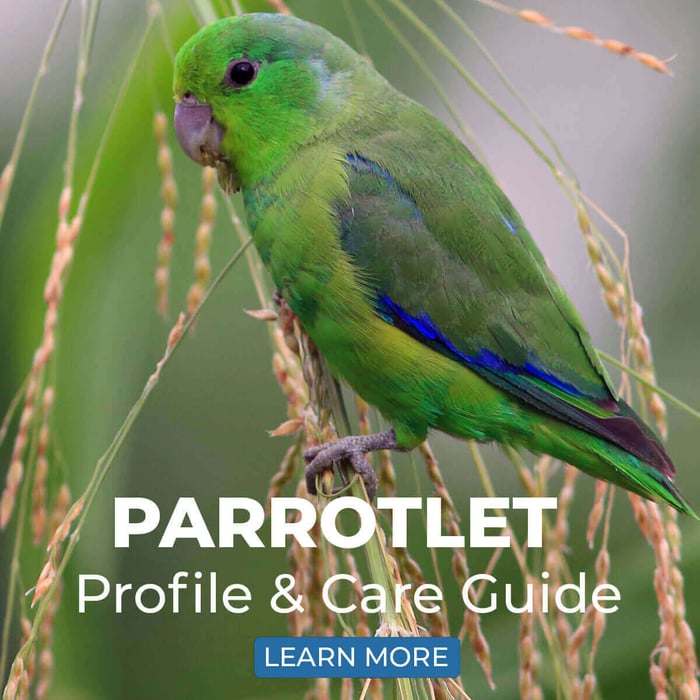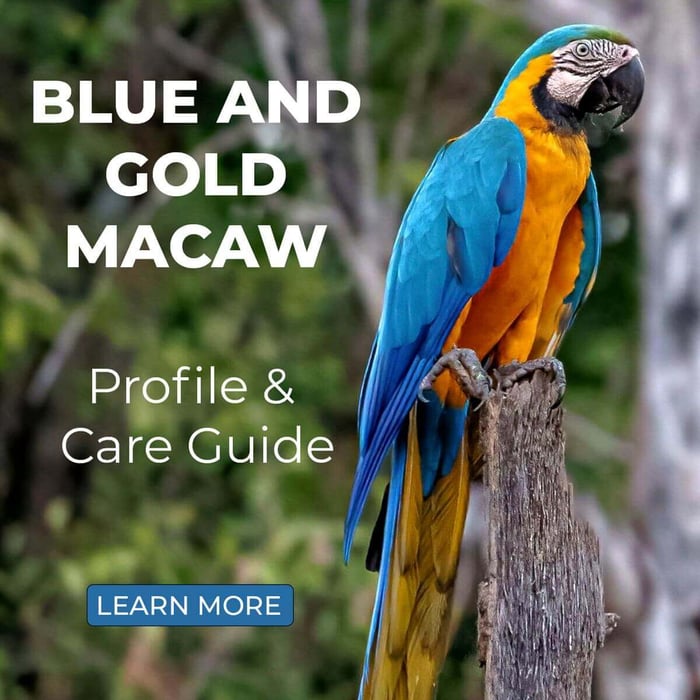Cockatiel – Profile & Care Guide
| Common name: | Cockatiel, weiro, quarrion |
| Latin name: | Nymphicus hollandicus |
| Length: | 29 - 33cm / 11 - 12.9 inches |
| Weight: | 80 - 100 grams |
| Life Span: | 15 - 20 years |
| Origin: | Australia |
| Noise Level: | Moderate. Males usually sing to attract a mate or at the beginning and end of the day, while females chirp to get the attention of their owner or mate. |
NATURAL HABITAT
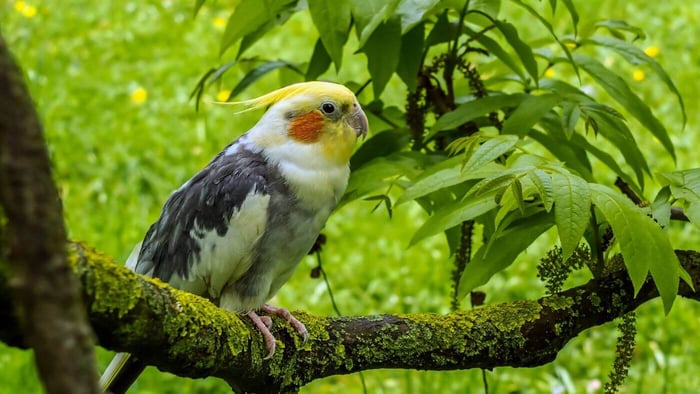
Cockatiels are native to the arid regions of Australia, specifically in the inland areas of the country. These charismatic birds inhabit a variety of habitats, including open woodlands, savannas, and scrublands. With their adaptable nature, they can thrive in both the coastal regions and the drier interior parts of Australia. They are often found in areas with access to water sources like rivers, creeks, and waterholes. These intelligent pets are social birds and are commonly seen in small flocks or family groups. Their natural habitat provides them with an abundance of grasses, seeds, fruits, and insects, which form the basis of their diet.
In their natural environment, these small parrots display a remarkable ability to adapt to different climatic conditions. They have evolved to withstand the challenges of the arid Australian landscapes. Their plumage serves as excellent camouflage, blending with the earthy tones of their surroundings. The dry and open woodlands offer ample perching sites, allowing them to spot predators or other birds from a distance. They are well-suited to the warm climate of their habitat, utilising their crest feathers to regulate body temperature and dissipate excess heat. With their charming and sociable nature, they bring life and vibrancy to the diverse ecosystems they call home.
COCKATIEL INTELLIGENCE & PERSONALITY
The world over, the small crested cockatiel has charmed and bewitched humans with its intelligence and friendly nature. These Australian parrots are characterised by their smart brains and calm, sociable dispositions, traits that make them a joy to interact with. They're considered suitable beginner parrots and make great pets.
Inherently curious and playfully spirited, a well-socialised cockatiel engages actively with its human "flock". The species' communication skills are worth noting too. They use their crest as a medium to express a range of emotions – from surprise to interest, fear and even anger.
When their intellectual curiosity is stimulated adequately, these small parrots are fairly easy to take care of and become delightful companions. However, it is essential to remember that if they are consistently ignored, they could potentially become cage-bound and suffer from loneliness or depression. The outcomes can be severe: bored birds may resort to plucking their own feathers, while an extremely depressed bird might even end up starving itself.
We, as bird owners, cannot emphasise enough the importance of social interaction and attention for your parakeet. Ensuring your bird is entertained is of paramount importance, and it is advisable to fill their cage with a variety of mind-stimulating parrot toys.
Well-trained birds develop a deep devotion to their human caregivers, usually content to ride around on your shoulder for much of the day. Fascinated by shiny objects like earrings and jewellery, they have been known to slyly remove these without your notice. So be vigilant: a cockatiel on your shoulder means your earrings are in danger!
TALKING ABILITY
These small parrots display a modest aptitude for human language, with an average vocabulary of around 25 words. Many males, especially when they're still young, can quickly learn to articulate easy words, song tunes and short phrases, such as 'hello' or 'pretty bird'. But be careful what you wish for once they've mastered these; they'll want to chime into your conversations whenever they get the chance.
These parrots, like many other species, also exhibit a penchant for mimicking household sounds. Whether it's the low hum of a microwave, the telephone ringing or the dog barking, they're keen observers and seem to enjoy imitating the sounds they hear around them on a daily basis.
While a cockatiel's speech may not have the crisp clarity of larger parrots like the African grey, we'd say there is a distinct charm to their slightly muffled utterances. Their impressive intelligence and exceptional mimicking abilities allow them to learn various phrases and even entire songs over time.
Did you know? Male cockatiels tend to be more vocal than their female counterparts, who tend to stick to soft chirps and more piercing flock calls.
This little guy is singing the theme song to The Addams Family, Darth Vader, and even saying 'what you doing':
FEEDING AND SUPPLEMENTS
- While pelleted diets offer a relatively balanced feed for your cockatiel, they lack phytonutrients, the antioxidant pigments found in vegetables, fruits, grains, and seeds. This means you should supplement your bird's diet with other foods.
- You can enhance your cockatiel's diet with a high-quality seed mix and plenty of healthy green foods. They enjoy dandelion leaves, weeds, carrot tops, celery, watercress, spinach, peas, seedling grasses, and millet.
- Fruits like apples, oranges, and bananas also make for a tasty treat.
- A cuttlebone is a beneficial addition to their cage—it not only provides calcium but also helps keep their beaks trim.
- Protein-rich foods can help with moults and support laying hens. You can offer mynah pellets, game bird starter, dog food, and even mashed hard-boiled eggs.
- Contrary to previous beliefs, cockatiels do not require grit. In fact, it can cause problems. Unlike birds like chickens, which swallow seeds whole, cockatiels remove the seed hull before consumption. This eliminates the need for grit.
- Ensure fresh, clean water is always accessible. Multiple water bowls would be ideal! Adding soluble vitamins and minerals to their water can further boost their nutrient intake.
- Lastly, cleanliness is crucial. Make sure to wash food and water dishes daily to maintain a sanitary environment. Paper lining on the bottom of the cage is easy to change.
HOUSING
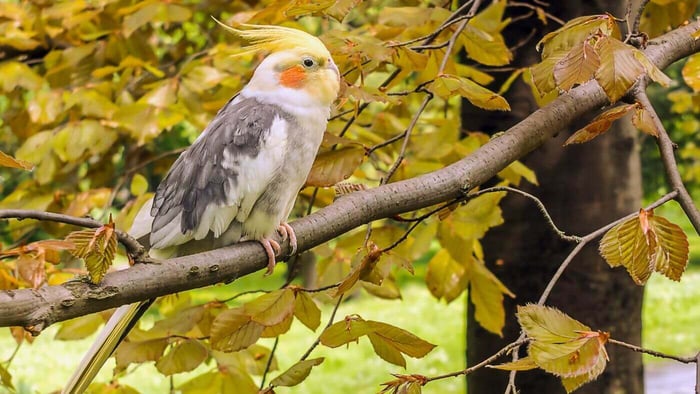
The cage for your cockatiel should be as spacious as possible.
Keep in mind the cage size—aim for a minimum of 24" x 18" x 24".
Pay attention to the bar spacing; ideally, it should range between ½" to 5/8" (1.3 – 1.6 cm). Any wider, and your cockatiel will be at risk of getting its head stuck.
Try to place the cage in a quieter corner away from high-traffic or noisy areas, though not locked away in a lonely room either. Cockatiels are very social, but they prefer observing the hustle and bustle from a peaceful distance.
Cockatiel cages with horizontal bars on the sides are a good choice—these little climbers will love it!
Ensure the cage is out of direct sunlight and away from draughts for your bird's comfort.
Your playful bird will appreciate a variety of toys. Offer them seed treats, swings, ladders, bells, mirrors, tree branches, and wooden chews. These will keep them active and also help keep their beaks trimmed. However, avoid toys that are not made with parrot-safe materials.
It's crucial to let your pet out of its cage daily for play and exercise, giving it a chance to stretch its wings.
FEATHER PLUCKING
Feather plucking in cockatiels is, unfortunately, a common as well as complicated issue. It typically flags either a physical or psychological problem with your bird. A myriad of factors can trigger this behaviour—diseases, allergies, skin toxins, unmet dietary needs, or even parasites. At times, it could simply be a behavioural reaction.
When handling a feather-plucking parrot, observation is key. Regular baths are beneficial for your feathery companion, helping to keep any bacteria or potential irritants at bay. As for the plucking itself, avoid giving them attention for it—yes, that includes even distraction.
Instead, reward your pet when they're peacefully playing or resting. Given their smarts, they crave mental stimulation from their caregivers and their environment. So, ensure an array of toys is always available for them to engage with. And don't forget to spend plenty of time hanging out with your bird to ensure its social needs are met!
To rule out any skin-related causes of feather plucking, consider investing in some skin-soothing products and supplements. You may also want to consider booking a check-up with an avian vet to rule out any serious health issues. It's all part of keeping your bird friend happy and healthy.
COCKATIEL FACTS
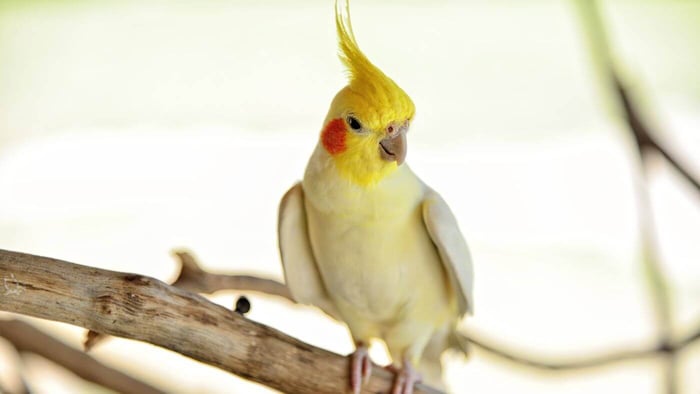
- Of all the small birds, they produce the most bird dander or dust. This is indicative of a healthy bird, and the 'powder' makes their feathers silky-smooth. This means you may want to install an air filter!
- These birds are particularly skittish and may have night frights, which involve panicked thrashing and may cause injury. Providing your parakeet with a night light helps them keep an eye on their surroundings and can help prevent night frights.
- Like many parrots, these little birds are crepuscular. This means they're most active around dawn and dusk. These are also the times you can expect your bird to make the most noise!
- They are actually members of the cockatoo family, although they're the only species in their genus Nymphicus. They're by far the smallest of the cockatiels.
FREQUENTLY ASKED QUESTIONS
Can Cockatiels Talk?
Although they're no African greys, they can learn to repeat simple words and phrases. They're also not bad at imitating tunes.
How Much Does A Cockatiel Cost?
You should be able to find them in the UK for £75 or up. If you've kept parrots before, though, why not see if you can rescue one? There are many birds looking for a good home.
SUMMARY
Well-socialised cockatiels are known for their sweet temperaments, complemented by a curiosity that makes them endlessly endearing to their owners. Their strong potential for bonding and remarkable affection make them charming companions. Small, intelligent birds and easy enough to care for, cockatiels have been delighting bird enthusiasts for many years.
Their engaging personalities and remarkable trainability have propelled them to the top of the most popular pet bird species list, only topped by budgies.
When nurtured with proper care, even a shy bird is bound to evolve into an affectionate and captivating pet. Their friendly dispositions and playful curiosity make them an excellent choice for novice bird owners. Their sweet natures shine through in their expressive crests, adding to their overall charm.
MORE PROFILES
To view other Parrot Profiles & Care Guides, visit our Alphabetical list of Parrot Fact Sheets by visiting: https://parrotessentials.co.uk/blog/parrot-profiles-care-guides


